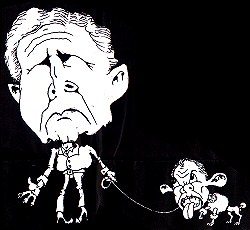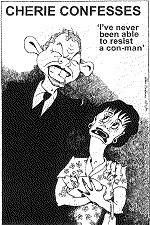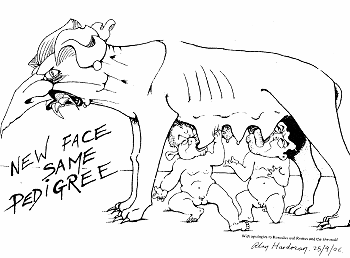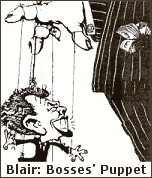Labour conference cheers can’t hide…
Blair more hated than Thatcher
NEVER BEFORE has the gap between reality and the spinmasters’ world
of the party conference season been so big, writes Socialist Party
deputy general secretary Hannah Sell.
 This was summed up by the reaction to Tony Blair’s saccharine
This was summed up by the reaction to Tony Blair’s saccharine
farewell speech at Labour Party conference. Inside the hall he was
greeted with a rapturous standing ovation. Yet the content of the speech
was a justification for profoundly unpopular government policies – the
very policies that have made Blair more hated than Thatcher in her final
days.
Blair lies on health…
WHILE CUTS and closures are taking place across the country,
including the threatened closure of 60 accident and emergency units,
Blair claimed that the NHS is getting better. Why then are tens of
thousands having to demonstrate against hospital cuts up and down the
country? This is the biggest protest movement on a domestic issue since
the mass campaign against the poll tax, which finished both the poll tax
and Thatcher.
In reality, New Labour is setting out to destroy the NHS. Only 11% of
people support further privatisation of public services, yet Blair used
his speech to justify the position of health minister, Patricia Hewitt,
that there should be ‘no limit’ to the privatisation of the health
service.
New Labour’s record on the NHS is reflected in the opinion polls. For
the first time since the NHS was founded by the 1945 Labour government,
the Tories are now ‘more trusted’ to run the NHS than Labour. In a
bizarre twist of history, in rural and semi-rural areas, Tory MPs are
taking part in, and even initiating, protest movements against health
cuts.
In fact the Tory Party, which began the current dismantling of the
NHS when they were in office, would be carrying out virtually identical
policies to New Labour if they were elected. In the last general
election they stood for a more rapid and complete privatisation of
health and education even than that being carried out by New Labour.
Now, belatedly realising that ‘defending the NHS’ is a vote winner,
they are opportunistically pretending to be the arch-defenders of the
health service. However, Cameron’s chief policy strategist, Oliver
Letwin, blurted out the truth to the Sunday Times, when he explained
that the Tories, like New Labour, oppose any limits on private companies
running parts of the NHS.
Blair lies on Iraq…
BLAIR WENT on to argue against the 72% of the population that think
that the occupations of Iraq and Afghanistan have made the world a more
dangerous and unstable place. He asserted:
"This terrorism isn’t our fault. We didn’t cause it. It’s not the
consequence of foreign policy. It’s an attack on our way of life. It’s
global. It has an ideology. It killed nearly 3,000 people including over
60 British on the streets of New York before war in Afghanistan or Iraq
was even thought of."
This is a facile argument which virtually no-one swallows.
Imperialist oppression of the Arab peoples did not begin with the
invasion of Iraq or even the brutal subjugation of the Palestinian
people over decades, but goes back at least as far as the imperialist
carve-up of the Middle East and its natural resources almost a century
ago.
The oppression of the Palestinians over the last decades has
undoubtedly angered the world’s 1.3 billion Muslims, as did the first
Iraq war and the sanctions against Iraq after the 1990-91 Gulf War.
These sanctions resulted in the death of half a million children,
described as "a price worth paying" by Madeline Albright, then US
Secretary of State.
Since then, that anger has been enormously fuelled by events since
9/11. And unlike the oppression of the Palestinians, the British
government has been directly and unequivocally involved in the bloody
occupation of Iraq.
More than 5,000 people were killed in Baghdad during July and August
alone. It is incontrovertible that, while the vast majority of Muslims
in Britain and worldwide, are opposed to terrorist attacks, the number
has increased who are so angry and alienated by what is taking place in
the Middle East that they are prepared to take this utterly mistaken
road.
This conclusion has even been drawn by both the US and British
intelligence agencies. A new and damning US National Intelligence
Estimate concluded that Iraq had hugely increased Bin Laden’s "status as
the ideological leader of a global movement".
Meanwhile at home an MI6 officer has written a report declaring: "The
war on Iraq has acted as a recruiting sergeant for extremists across the
Muslim world…Iraq has served to radicalise an already disillusioned
youth and al-Qaeda has given them the will, intent purpose and ideology
to act."
Blair lies on Israel/Palestine…
BLAIR WENT on to defend nuclear power, attacks on civil liberties,
and privatisation of education. However, it was the final moments of his
speech that demonstrated how utterly he has lost touch with reality. He
declared that he would spend his final time in office working towards
bringing peace to Israel and Palestine!
Following Blair’s complete support for Israel’s recent onslaught on
Lebanon this will have been greeted with outrage by millions in Britain
and the Middle East. When Blair recently visited the occupied
territories he got a taste of how he is viewed by the masses of the
Middle East. One group of hundreds of Palestinians took out a full page
advert in a Palestinian newspaper:
"[Blair] is coming here to wash his hands, hands that are dripping
with Lebanese blood, with Palestinian water. We the
signatories…notables, intellectuals and politicians declare that Tony
Blair is persona non grata."
Persona non grata
 TONY BLAIR is also ‘persona non grata’ – diplomatic language for
TONY BLAIR is also ‘persona non grata’ – diplomatic language for
unacceptable and unwelcome – in Britain. Labour MPS and councillors met
his speech with rapturous applause, but they know that Tony has to go if
they are to stand a chance of saving their own careers. Blair clearly
hopes to stay until next summer on the back of his conference speech.
This is possible, but it is more likely that his MPs will rebel again
with the next dip in the opinion polls. However, the New Labour
politicians are making a mistake if they imagine that getting rid of
Blair will solve their problems. Fundamentally, it is Blairism, rather
than Blair himself, which is unpopular.
More people are opposed to the occupations of Iraq and Afghanistan at
any time since the war on Iraq began – 53% now believe the war was a
mistake. Demands for withdrawal of the troops are growing. ITV news
declares that conditions for British troops in Afghanistan are
comparable to the First World War!
British soldiers in Afghanistan are being killed at six times the
rate they are in Iraq. It is now revealed that the tops of the military
told John Reid eighteen months ago that the army couldn’t cope with Iraq
and Afghanistan and that one front would have to be abandoned.
New Labour, in its desperation to do the Bush administration’s
bidding, ignored this and went ahead. However, such is the unpopularity
of the war, and the strain on the British army, it is possible that the
government, whether under Blair or his successor, will be forced to
withdraw troops from Iraq.
Even if this does take place, however, it will not alter the general
direction of the government – of supporting US imperialism’s brutal
foreign policy abroad, and attacking workers’ living conditions at home.
Big business government
THIS GOVERNMENT’S anti-working class, pro-big business attitude is
summed up by its desperate attempts to try and keep Britain’s position
as the only EU country to opt out of the maximum 48 hour average working
week. Officially, one-fifth of workers in Britain work more than 48
hours a week.
The government justifies itself by quoting recent surveys showing
that a majority of the population believes that there should be no limit
on working hours, but this ignores the question of pay. Given the option
of earning enough to live comfortably while working a maximum 35-hour
week, the vast majority of workers would choose to do so.
But for a growing number of workers in Britain it is necessary to
‘work-till-you-drop’ to make ends meet. Twelve million Britons live
below the poverty line. Meanwhile the pay of Britain’s top company
directors soared by 28% in the last year, seven times the average rate
of increase.
Unlike the rich few at the top, for many working and middle-class
Britons, the only way they can survive is by the use of credit or, as it
is otherwise known, debt. Britain has by far the highest levels of
personal debt in Europe. The level of indebtedness is so high that even
the relatively small, by historical standards, increase in interest
rates over the last period has led to record levels of bankruptcy.
Young people are the worst affected. There has been a rise in
bankruptcy of 18-29 year olds of 288% between 2001 and 2005! No wonder
that the majority of people in Britain do not credit Brown with ‘good
handling’ of the economy.
The Organisation for Economic Cooperation and Development (OECD)
hails Britain as the world’s Goldilocks economy – neither too hot nor
too cold – but most working-class people have a very different
experience. This experience will become even worse when, at a certain
stage, the enormous bubble of debt, largely based on rising house prices
(which is keeping the economy afloat) deflates decisively. Already
unemployment is creeping up to its highest level in six years.
Brown the Blairite
 IT IS likely that Brown, having been a lucky Chancellor, will be a
IT IS likely that Brown, having been a lucky Chancellor, will be a
very unlucky prime minister, coming to office just as the underlying
economic trends are played out. Even if this is not the case in the
short term, Brown, who remains the most likely candidate to succeed
Blair, will clearly carry on with the same neo-liberal, anti-working
class policies as his predecessor.
The bitterness and divisions at the top of the Labour Party have
virtually no ideological content. They are little more than a desperate
scramble to save careers as the government runs into the sand.
Tony Blair is accelerating attacks on the NHS in his last period in
office – but Brown is pledging to continue the onslaught. Brown has said
he will "intensify" privatisation of the health service and it was Brown
who intervened in the Labour Party NEC to demand that its members
support the ‘marketisation’ of the NHS and particularly the handing of
NHS Logistics to private company DHL.
Despite Brown’s role behind the scenes a motion opposing further
privatisation of the NHS was passed at the conference. This has been
hailed, along with motions passed on council housing and the rights of
agency workers, as a victory by the trade union leaders. However, the
Labour Party’s democratic structures the have been destroyed – and its
conference no longer has any power.
This is the third year running that the trade union vote has resulted
in opposition to privatisation being passed at Labour Party conference.
Outside in the real world privatisation is proceeding at a rate of
knots.
Role of union leaders
HOW DID the trade union leaders respond to events at the Labour Party
conference? Dave Prentis, general secretary of UNISON, the union which
organises the NHS logistics workers, welcomed Brown’s speech because of
its "emphasis on listening and learning".
Prentis added: "There was enough in his speech to give us hope that
he will listen about the direction of reform." This is nothing new. Last
year Prentis welcomed Brown’s neo-Thatcherite speech as "Labour values
at their best".
 Undoubtedly, some workers are hoping against hope that Brown is only
Undoubtedly, some workers are hoping against hope that Brown is only
pretending to be a Blairite, and will reveal his true socialist colours
once elected. Unfortunately, there is no possibility of this happening.
For Prentis and other trade union leaders, who have sat and listened to
Brown argue for the privatisation of their members’ jobs, to make such
favourable comments about Brown is a dereliction of duty.
The Socialist Party does not believe it is possible for the trade
unions to ‘reclaim’ the Labour Party. Since 1997 the trade unions have
given £100 million to the Labour Party but it has not altered the
big-business nature of this government one iota.
New Labour today sings to altogether another tune. Yet again at this
year’s conference, big-business sponsors outnumbered delegates. A fringe
meeting on "marketing food and health" was addressed by Kellogg’s. A
representative of Tesco spoke alongside Alan Johnson. BUPA spoke at a
Fabian meeting together with Health Minister Andy Burnham. The Socialist
Party argues that the trade unions should stop funding this party of big
business and start to build a new party, which actually stands in their
members’ interests.
However, the majority of trade union leaders argue that Labour can be
reclaimed. If they are serious about this they should make it clear that
they will not be backing Brown. The only candidate who stands on an
anti-privatisation, anti-cuts programme is John McDonnell MP.
We argue that the union leaders should call for their members to vote
for him. Unfortunately, none of the leaders of the major affiliated
trade union have given any indication they will do so.
Even if Prentis and others were to back McDonnell, this would not be
a substitute for organising action to defend public services. The NHS
logistics workers have shown their willingness to struggle against
privatisation, but the two one-day strikes that the national leadership
have sanctioned will not be enough. To win a victory, it will be
necessary to build towards all-out action, as part of the development of
a mass struggle against NHS cuts.
National NHS demo
THERE IS no doubt that the potential exists for a huge movement to
defend the NHS, however, as yet the TUC has no date set for a national
demonstration. The lobby of parliament on 1 November is a step forward,
but far more will be needed to stop the cuts in their tracks.
The Socialist Party is backing the lobby of parliament, and the
feeder march to it initiated by London pensioners. At the same time, we
are campaigning for a national demonstration to be called. Such a
demonstration could act as a catalyst for the enormous anger that exists
not just on the NHS, but on every aspect of public services, and on low
pay and working hours.
We are also stepping up our call for the building of a new mass party
of the working class. 95% of people believe New Labour could do more for
working people! Since 1997 four million ‘working people’ have stopped
voting for New Labour. A few switched to the Liberal Democrats, wrongly
believing they are ‘left’ of Labour.
A thin layer, particularly in the South, has even voted Tory. The
Tories’ biggest problem, however, is that they still bear the mark of
Cain for the crimes they committed during their eighteen years in power.
In the major cities of the North they have failed to make any
breakthroughs. In Manchester they do not have a single councillor!
It will take more than a new, young ‘Blair-style’ party leader to dim
the memory of the vicious anti-working-class policies of Thatcher.
Nonetheless, on the basis of a low turnout, a Tory victory at the next
election cannot be excluded.
However, many, probably a majority, of ex-Labour voters cannot bring
themselves to vote for any of the big three big-business parties and are
therefore not voting at all. The potential for a new mass party – that
stands in the interests of the millions not the millionaires – is clear.
One of the key tasks for socialists in the coming months and years is to
bring such a party into being.







